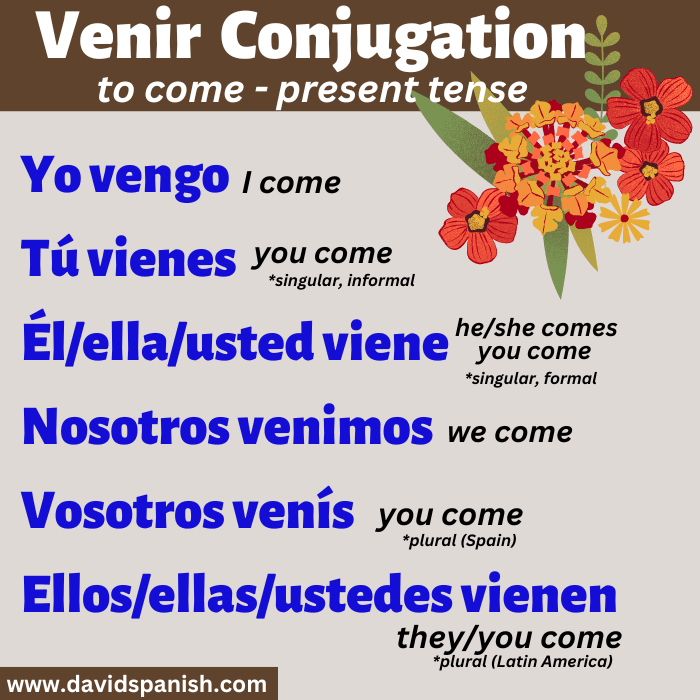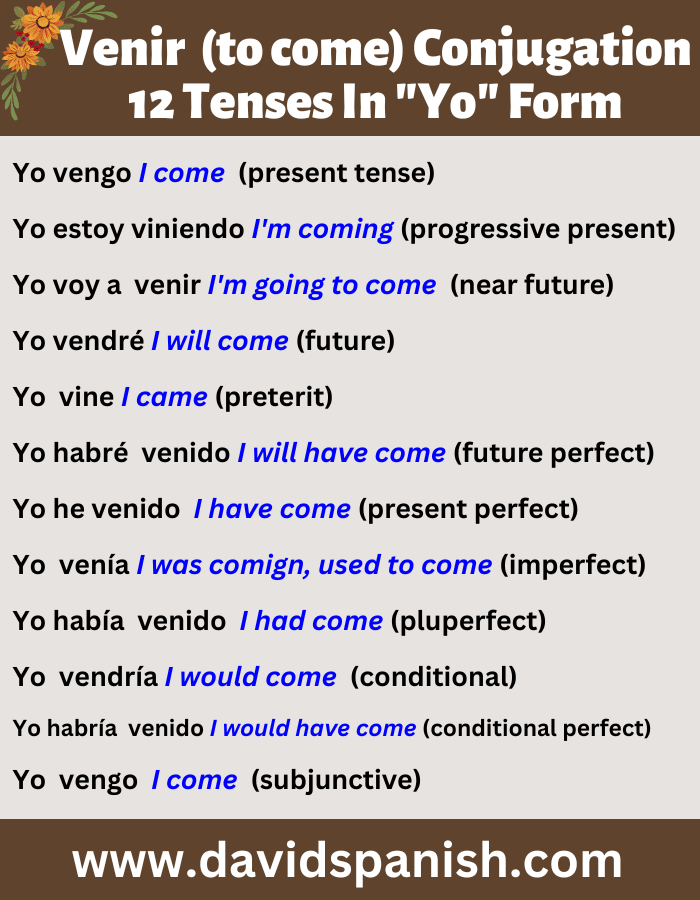
Venir (Meaning: To come) is a basic Spanish verb for all beginner students. The present tense conjugation of venir is: Yo vengo (I come), tú vienes (you come), él/ella/usted viene (he/she comes, you come), nosotros venimos (we come), vosotros venís (you come) and ellos/ellas/ustedes vienen (they/you come).

Venir is an irregular IR verb. This is because while its endings when conjugated in the present tense are the same as all other regular IR verbs, its stem changes. This page on our site covers regular and irregular Spanish IR verbs in detail.

Further down the page we provide conjugation charts for venir in the following nine commonly used Spanish verb tenses:

The following graphic shows venir (to come) conjugated in twelve tenses in the first-person singular (yo) form.

In the present tense, yo vengo translates to “I come” and “I am coming”.
| yo vengo | I come | Yo vengo de este país. | I'm from this country. |
| tú vienes | you come | ¿De dónde vienes, compadre? | Where are you from, buddy? |
| él/ella, usted viene | he/she comes; you come | Él viene de la oficina. | He's coming from the office. |
| nosotros venimos | we come | Venimos de la casa de los vecinos. | We're coming from the neighbors' house. |
| vosotros venís | you come | Venís de Barcelona o Madrid? | Are you from Barcelona or Madrid? |
| ellos/ellas, ustedes vienen | they/you come | Ellos vienen esta tarde a visitarnos. | They're coming tonight to visit us. |
The near future tense is formed with the following construction: ir (to go) conjugated in the present tense + preposition a + infinitive. Yo voy a venir translates to “I’m going to come”.
| yo voy a venir | I am going to come | Yo voy a venir esta noche. | I'm going to come tonight. |
| tú vas a venir | you are going to come | Vas a venir mañana? | Are you going to come tomorrow? |
| él/ella, usted va a venir | He/she is going to come; you are going to come | ¿Por qué no va a venir a la velada? | Why isn't he going to come to the soirée? |
| nosotros vamos a venir | we are going to come | ¡No se preocupe! Vamos a venir. | Don't worry! We're going to come. |
| vosotros venís a venir | you are going to come | ¿Venís a venir a mi boda? | Are you going to come to my wedding? |
| ellos/ellas, ustedes van a venir | they/you are going to come | Ellos van a venir la semana que viene. | They're going to come next week. |
In the future tense, yo vendré translates to “I will come”.
| yo vendré | I will come | Yo vendré el año que viene. | I'll come next year. |
| tú vendrás | you will come | ¿Vendrás con tu esposa? | Will you come with your wife? |
| él/ella, usted vendrá | he/she/you will come | ¿Cuándo vendrá el patrón? | When will the boss come? |
| nosotros vendremos | we will come | Vendremos en mi coche nuevo. | We'll come in my new car. |
| vosotros vendréis | you will come | Vendréis de Chile o Bolivia? | Will you come Chile or Bolivia? |
| ellos/ellas, ustedes vendrán | they/you will come | Ellos no vendrán esta fin de semana. | They won't come this weekend. |
The preterite is a commonly used Spanish past tense used to express actions which occurred at defined moments in time.
| yo vine | I came | Vine con todos mis compañero. | I came with all my friends. |
| tú viniste | you came | ¿Por qué no viniste ayer? | Why didn't you come yesterday? |
| él/ella, usted vino | he/she, you came | Ella vino con su esposo y sus niños. | She came with her husband and her friends. |
| nosotros vinimos | we came | Vinimos de trabajo juntos. | We came from work together. |
| vosotros vinisteis | you came | ¿Vinisteis ayer o anteayer? | Did you come yesterday or the day before yesterday. |
| ellos/ellas, ustedes vinieron | they/you came | Ellos no vinieron de Guatamala. Vinieron de Costa Rica. | They didn't come from Guatamala. They came from Costa Rica. |
The past indefinite tense is used to express past actions which have a bearing on the present. Yo he venido translates to “I have come”.
| yo he venido | I have come | Yo he venido a explicar la situación. | I've come to explain the situation. |
| tú has venido | you have come | Tú has venido para aprender catalán. | You've come to learn Catalan. |
| él/ella, usted ha venido | he/she/you have (has) come | Él ha venido para buscar trabajo. | He's come to look for a job. |
| nosotros hemos venido | we have come | Hemos venido para ayudarles. | We've come to help you. |
| vosotros habéis venido | you have come | Habéis venido en su coche nuevo. | You've come in your new car. |
| ellos/ellas, ustedes han venido | they/you have come | Han venido para comprar mi casa. | They've come to buy my house. |
The imperfect is a commonly used Spanish past tense used to describe past actions which used to occur or were occurring over time. Yo venía translates to “I used to come”, “I was coming” and “I came”.
| yo venía | I was coming (or used to come, came) | Yo venía cuando llegaste. | I was coming when you arrived. |
| tú venías | you were coming | Tú venías de la playa cuando compraste el helado. | You were coming from the beach when you bought an ice cream. |
| él/ella, usted venía | he/she, you were (was) coming | Cuando era niño, venía cada fin de semana. | When he was a child he used to come every weekend. |
| nosotros veníamos | we were coming | Veníamos cuando empezó a nevar. | We were coming when it started to snow. |
| vosotros veníais | you were coming | Veníais de vez en cuando erais jovenes. | You used to come from time to time when you were young. |
| ellos/ellas, ustedes venían | they were coming | Venían cada día si tuvieron tiempo. | They used to come every day if they had time. |
The conditional tense is used to express hypothetical situations. Yo vendría translates to “I would come”.
| yo vendría | I would come | Yo vendría si tuviera más tiempo. | I'd come if I had more time. |
| tú vendrías | you would come | Tú vendrías si tuvieras el coche. | You'd come if you had the car. |
| él/ella, usted vendría | he/she, you would come | Ella vendría si tuviera el día libre. | She'd come if she had the day off. |
| nosotros vendríamos | we would come | Vendríamos si tuviéramos boletos. | We'd come if we had tickets. |
| vosotros vendríais | you would come | Vendríais si tuvierais las bicicletas. | You'd come if you had the bicycles. |
| ellos/ellas, ustedes vendrían | they/you would come | Ellos vendrían si tuvieron novias. | They'd come if they had girlfriends. |
The subjunctive mood is used to express wishes, emotions and doubts. Yo venga translates to “I come”.
| yo venga | I come | Es importante que venga a la reunión. | It's important that I come to the meeting. |
| tú vengas | you come | Es necesario que vengas ahora mismo. | It's necessary that you come right away. |
| él/ella, usted venga | he/she comes; you come | No estoy cierto que venga. | I'm not sure he's coming. |
| nosotros vengamos | we come | Quieren que vengamos a la fiesta esta noche. | They want us to come to the party tonight. |
| vosotros vengáis | you come | ¿Cúando vengáis, tíos? | When are you coming guys? |
| ellos/ellas ustedes vengan | you/they come | Queremos que vengan a nuestra boda. | We want you to come to our wedding. |
The imperative mood is used for giving commands. In the third-person plural (nosotros) form, the imperative translates to “let’s”. Example sentences are under the chart.
| (tú) ¡ven! | Come! | ¡no vengas! | Don't come! |
| (usted) ¡venga! | Come! | ¡no venga! | Don't come! |
| (nosotros) ¡vengamos! | Let's come! | ¡no vengamos! | Let's not come! |
| (vosotros) ¡venid! | Come! | ¡no vengáis! | Don't come! |
| (ustedes) ¡vengan! | Come! | ¡no vengan! | Don't come! |
David is a lifelong student and teacher of languages. When he's not working on this website, he's watching Spanish TV, practicing Spanish with the people in his community, hiking, biking or skiing.
Latest posts by David Issokson (see all)
¡Hola! My name is David Issokson. I'm based in Victor, Idaho (near Jackson, Wyoming). I am here to help you throughout your adventures learning Spanish!